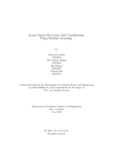| dc.contributor.advisor | Rasel, Annajiat Alim | |
| dc.contributor.advisor | Rahman, Rafeed | |
| dc.contributor.author | Arefin, Mahbubul | |
| dc.contributor.author | Hekim, Md. Lokman | |
| dc.contributor.author | Farjana, Afia | |
| dc.contributor.author | Bala, Nisarga | |
| dc.date.accessioned | 2023-12-05T06:32:16Z | |
| dc.date.available | 2023-12-05T06:32:16Z | |
| dc.date.copyright | 2023 | |
| dc.date.issued | 2023-05 | |
| dc.identifier.other | ID 17201083 | |
| dc.identifier.other | ID 18101499 | |
| dc.identifier.other | ID 19101429 | |
| dc.identifier.other | ID 20101533 | |
| dc.identifier.uri | http://hdl.handle.net/10361/21920 | |
| dc.description | This thesis is submitted in partial fulfillment of the requirements for the degree of Bachelor of Science in Computer Science, 2023. | en_US |
| dc.description | Cataloged from PDF version of thesis. | |
| dc.description | Includes bibliographical references (pages 23-24). | |
| dc.description.abstract | Lung cancer is a term known to all nowadays. This disease grows in the lung tissues
and starts to spread with time. The cells responsible for air passage are corrupted
by it. It can happen because of air pollution. When we breathe in polluted air
regularly, our lungs are likely to be damaged. But by smoking, a lot of people are
damaging their lungs repeatedly. Due to this act, they are receiving lung cancer as
consequence. It has been affecting people acutely and if prevented in earlier states,
then the rate of death would lessen. In order to do that, we have proposed some
methods to detect this illness. Machine Learning is a technique where machines
(computers) can give us a solution to a problem by analyzing the collected data.
Using this method, we can detect lung cancer which is the first step towards our
desired goal. Usage of CT scan could help us decide between cancer affected and
unaffected human cells. Those cells also can be classified more efficiently and we can
accurately detect the stage of the cancer when we use CNN models like VGG-19,
ResNet50, EfficientNet, DenseNet and so on. We got the highest accuracy from
ResNet50 which is 89.52%. | en_US |
| dc.description.statementofresponsibility | Mahbubul Arefin | |
| dc.description.statementofresponsibility | Md. Lokman Hekim | |
| dc.description.statementofresponsibility | Afia Farjana | |
| dc.description.statementofresponsibility | Nisarga Bala | |
| dc.format.extent | 35 pages | |
| dc.language.iso | en | en_US |
| dc.publisher | Brac University | en_US |
| dc.rights | Brac University theses are protected by copyright. They may be viewed from this source for any purpose, but reproduction or distribution in any format is prohibited without written permission. | |
| dc.subject | Lung cancer detection | en_US |
| dc.subject | Prediction | en_US |
| dc.subject | CNN | en_US |
| dc.subject | CT scan | en_US |
| dc.subject.lcsh | Machine learning | |
| dc.subject.lcsh | Cancer--Diagnosis--Data processing | |
| dc.title | Lung cancer detection and classification using machine learning | en_US |
| dc.type | Thesis | en_US |
| dc.contributor.department | Department of Computer Science and Engineering, Brac University | |
| dc.description.degree | B.Sc. in Computer Science and Engineering | |

